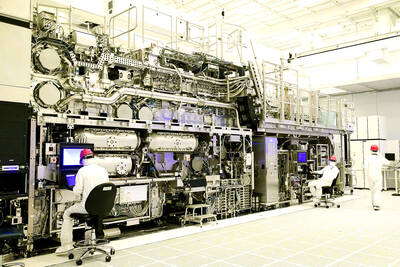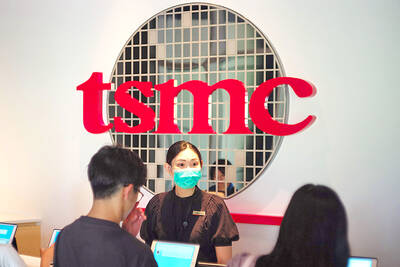Israel yesterday signed a free-trade agreement with the United Arab Emirates (UAE), its first big trade accord with an Arab state that reduces or removes tariffs and over time targets lifting annual bilateral trade to more than US$10 billion.
The pact was signed in Dubai by Israeli Minister of Economy and Industry Orna Barbivai and UAE Minister of Economy Abdulla bin Touq al-Marri, after months of negotiations.
Tariffs are to be eliminated on 96 percent of goods with the UAE, predicting the Comprehensive Economic Partnership Agreement would boost bilateral trade to more than US$10 billion a year within five years.

Photo: Reuters
Emirati Minister for Foreign Trade Thani al-Zeyoudi said the trade deal wrote “a new chapter in the history of the Middle East.”
“Our agreement will accelerate growth, create jobs and lead to a new era of peace, stability, and prosperity across the region,” he wrote on Twitter.
Dorian Barak, president of the UAE-Israel Business Council, said the trade agreement defined tax rates, imports and intellectual property, which would encourage more Israeli companies to set up offices in the UAE, particularly in Dubai.
The council predicts there would be almost 1,000 Israeli companies working in or through the UAE by the end of the year doing business with South and East Asia, and Middle East.
“The domestic market doesn’t represent the entirety of the opportunity. The opportunity is really setting up in Dubai, as many companies have, in order to target the broader region,” Barak told Reuters by telephone.
Emirati-Israeli trade reached US$1.2 billion last year, according to official Israeli data.
Ahead of the signing, Israel’s economy ministry had said the accord would remove tariffs on food, agriculture, cosmetics, medical equipment and medicine.
“Together we will remove barriers and promote comprehensive trade and new technologies, which will form a solid foundation for our common path, will contribute to the well-being of citizens and make it easier to do business,” Barbivai said on Monday.
Israel and the UAE established ties in September 2020 in a US-brokered deal that broke with decades of Arab policy that had called for a Palestinian state before ties with Israel.

ASML Holding NV’s new advanced chip machines have a daunting price tag, said Taiwan Semiconductor Manufacturing Co (TSMC, 台積電), one of the Dutch company’s biggest clients. “The cost is very high,” TSMC senior vice president Kevin Zhang (張曉強) said at a technology symposium in Amsterdam on Tuesday, referring to ASML’s latest system known as high-NA extreme ultraviolet (EUV). “I like the high-NA EUV’s capability, but I don’t like the sticker price,” Zhang said. ASML’s new chip machine can imprint semiconductors with lines that are just 8 nanometers thick — 1.7 times smaller than the previous generation. The machines cost 350 million euros (US$378 million)

Apple Inc has closed in on an agreement with OpenAI to use the start-up’s technology on the iPhone, part of a broader push to bring artificial intelligence (AI) features to its devices, people familiar with the matter said. The two sides have been finalizing terms for a pact to use ChatGPT features in Apple’s iOS 18, the next iPhone operating system, said the people, who asked not to be identified because the situation is private. Apple also has held talks with Alphabet Inc’s Google about licensing its Gemini chatbot. Those discussions have not led to an agreement, but are ongoing. An OpenAI

‘FULL SUPPORT’: Kumamoto Governor Takashi Kimura said he hopes more companies would settle in the prefecture to create an area similar to Taiwan’s Hsinchu Science Park The newly elected governor of Japan’s Kumamoto Prefecture said he is ready to ensure wide-ranging support to woo Taiwan Semiconductor Manufacturing Co (TSMC, 台積電) to build its third Japanese chip factory there. Concerns of groundwater shortages when TSMC’s two plants begin operations in the prefecture’s Kikuyo have spurred discussions about the possibility of tapping unused dam water, Kumamoto Governor Takashi Kimura said in an interview on Saturday. While Kimura said talks about a third plant have yet to occur, Bloomberg had reported TSMC is already considering its third Japanese fab — also in Kumamoto — which would make more advanced chips. “We are

EXPLOSION: A driver who was transporting waste material from the site was hit by a blunt object after an uncontrolled pressure release and thrown 6m from the truck Taiwan Semiconductor Manufacturing Co (TSMC, 台積電) said yesterday there was no damage to its facilities after an incident at its Arizona factory construction site where a waste disposal truck driver was transported to hospital. Firefighters responded to an explosion on Wednesday afternoon at the TSMC plant in Phoenix, the Arizona Republic reported, citing the local fire department. Cesar Anguiano-Guitron, 41, was transporting waste material from the project site and stopped to inspect the tank when he was made aware of a potential problem, a police report seen by Bloomberg News showed. Following an “uncontrolled pressure release,” he was hit by a blunt